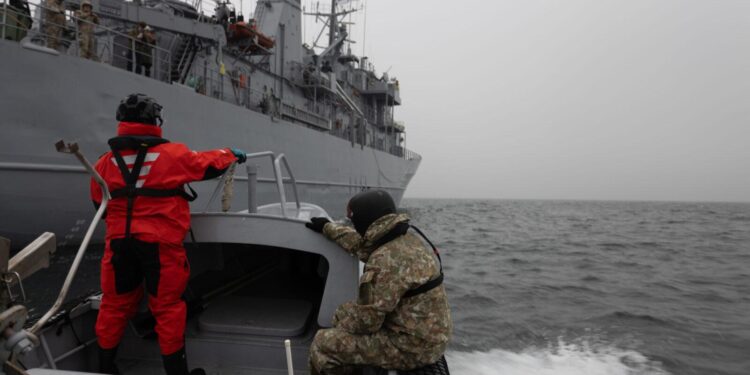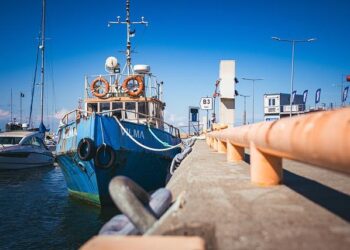Heightened Tensions in the Baltic: Estonia’s Standoff with Russian Naval Forces
The recent encounter between Estonia and a Russian oil tanker has escalated tensions in the Baltic Sea, illuminating the fragile geopolitical landscape of Northern Europe. This incident, which unfolded in international waters, underscores growing anxieties regarding maritime security and territorial integrity among Baltic states amid increasing friction between NATO and Russia. As Estonia’s response draws attention from international observers, the implications for regional stability and energy security are becoming more pronounced. This scenario not only highlights the challenges faced by smaller nations overshadowed by larger powers but also raises essential questions about future collaboration and conflict within this historically volatile region.
Diplomatic Strains as Estonia Asserts Itself Against Russian Maritime Activities
Estonia’s recent confrontations with Russian naval operations have added new layers of tension to an already fraught surroundings in the Baltic region. Known for its steadfast allegiance to NATO and EU principles,Estonia has reacted decisively to what it perceives as provocative actions by Russian vessels. This escalation follows several incidents where Estonian officials accused Russian naval forces of intruding into its territorial waters, leading to heightened naval patrols and surveillance initiatives.
In response to these developments, key Estonian leaders have emphasized their commitment to maintaining sovereignty and security within their maritime domain. The primary actions taken by Estonia include:
- Upgrading capabilities for maritime monitoring.
- Pursuing diplomatic dialogues with neighboring Baltic countries and NATO allies.
- Launching public awareness campaigns centered on maritime safety issues.
Moreover,discussions are underway regarding potential joint military drills with allied forces aimed at presenting a unified stance against perceived threats. As Estonia strengthens its position, there remains a significant risk of further escalations that keep regional stakeholders vigilant.
Economic Impact of the Baltic Confrontation: Effects on Regional Trade Dynamics
The clash involving Estonia and a Russian oil tanker has notably intensified existing tensions within the Baltic region while raising critical economic concerns. With supply routes becoming increasingly precarious due to geopolitical strife, local economies face complex challenges related to maritime security alongside import-export activities. As Russia adopts a more assertive posture in this area, nations like Latvia and Lithuania may need to reevaluate their reliance on Russian energy supplies‚ÄĒpossibly steering them toward new trade alliances or adjustments aimed at bolstering resilience against geopolitical uncertainties.
This incident could serve as a catalyst prompting these countries to seek alternative energy sources while diversifying their economic ties‚ÄĒfostering greater autonomy amid rising tensions. Furthermore, we may witness stricter regulatory frameworks emerging alongside enhanced monitoring protocols governing maritime operations throughout the Baltic Sea; such changes could significantly impact shipping costs while altering logistics strategies across various sectors.
Companies operating within this realm might find themselves compelled to invest more heavily into compliance measures designed to strengthen security protocols‚ÄĒultimately affecting overall operational expenditures.
Conversely, if these nations can effectively collaborate against incursions from Russia; it could lead not only towards improved regional stability but also foster deeper economic cooperation among them‚ÄĒpotentially resulting in stronger support mechanisms for local industries through government investments directed towards national infrastructure enhancements that pave pathways toward robust trade agreements moving forward.
Strategic Recommendations for Baltic Nations Addressing Maritime Disputes
<pGiven escalating sea tensions; it is indeed crucial that Baltics implement comprehensive strategies designed both protect national interests while ensuring ongoing regional stability.A focus on enhancing diplomatic channels would be vital when aiming mitigate misunderstandings whilst fostering collaboration amongst neighboring states‚ÄĒa goal achievable through:
- Sustained high-level meetings involving leaders from all three countries centered around discussions concerning marine safety issues;
- Aggressive diplomatic outreach efforts targeting international organizations seeking broader support;
- Cohesive training programs emphasizing joint exercises focused specifically upon managing potential conflicts arising out disputed waters;
Additionally investing resources into developing advanced systems capable detecting incursions early will prove essential moving forward‚ÄĒincluding exploring technology-sharing arrangements allies possess along enhancing domestic capabilities available locally.
Main recommendations include:
| Proposal | Aim |
|---|---|
| Deploy drone surveillance units | Enhance situational awareness across contested areas |
| Create rapid response units | Ensure timely intervention & deterrence |
| Engage jointly patrolling operations together with allies | Demonstrate solidarity & strength |
















